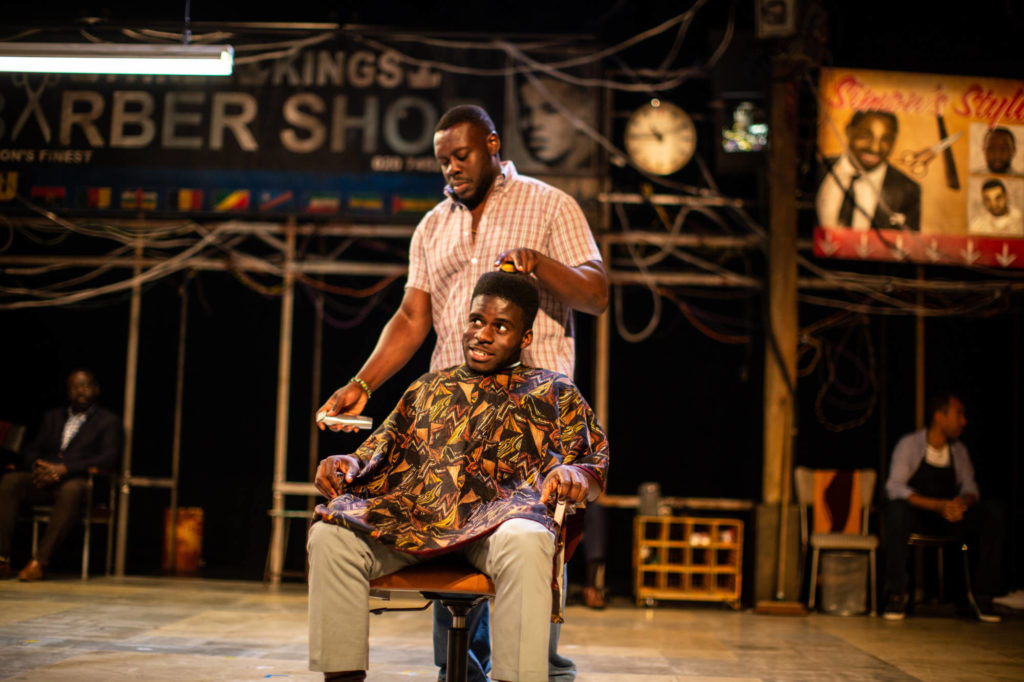
By Sheila Barth
BOX INFO: One-act, 110-minute play, written by Inua Ellams, co-produced by The Fuel, National Theatre, and West Yorkshire Playhouse, appearing at American Repertory Theater (A.R.T.) through Jan. 5, 2019, on its US premiere tour, Loeb Drama Center, 64 Brattle St., Cambridge: Dec. 19-22. 26-29, 31, Jan. 2-5, at 7:30 p.m.; Dec. 19,22,23, 27, 29-31, Jan.5, 2 p.m.. Tickets start at $25, subscriber, member, groups, student, senior, Blue Star families EBT cardholders and other discounts. americanrepertorytheater.org, 617-547-8300.
We all do it. While getting our hair cut or styled at the barber shop or salon, we engage in small talk with our hairdresser/barber. We even discuss lofty topics, solving the world’s problems. Sometimes, we lean over a bit to eavesdrop on what the person in the chair nearby is revealing. Strangely enough, we openly talk about family and friends’ secrets, our feelings, likes and dislikes, political and personal problems to a stranger. You never know what truths, boasting, or bravado may erupt, but you know the dynamic exists globally.
That’s the premise upon which Nigerian-born, British transplant author Inua Ellams, bases his play, “Barber Shop Chronicles”. There’s more to his premise, too. Ellams explores the fact that African men, regardless of what country they’re in or hail from, gather at the local barber shop to talk men’s talk – real men’s talk. It’s a place they can come together without fear of being arrested, he says. Whether they’re in London, Johannesburg, South Africa, Ghana, Harare, Kamplala, Lagos, Nigeria, Uganda, or Accra, their conversation is spirited. Seated in barber’s chairs, as the barber ceremoniously drapes a cape over his customers, his scissors or clippers poised artistically like a surgeon, African men discuss the world and masculine issues. They profess their sexual prowess, family issues, fatherhood and how times have changed. Some immigrants and migrants decry post-African diaspora, the accursed aftermath of British colonization and its ruinous effect on their culture and language. Languages are emerging together, erupting or dying in cultural erosion because of globalization and post-colonization.
They also explore the topic of gays’ treatment in Uganda, Mandela’s and other political leaders’ roles in shaping or destroying their countries. Between these lively scenes, Jack Knowles’ subtle spotlights highlight large banners hanging aloft, indicating where the next barbershop scene occurs. An illuminated circular mobile, bearing a blue-outlined Africa, slowly swirls above, while the 12 men chant a cappella, dancing tribally, at times in a circle, their arms interlocked.
Kudos, Music Director Michael Henry and Movement Director Aline David.
Deftly directed by Bijan Sheibani, several of the dynamic dozen actors – Maynard Eziashi, Alhaji Fofana, Solomon Israel, Mohammed Mansaray, Patrice Naiambana, Anthony Ofoegbu, Kenneth Omole, Ekow Quartey, Jo Servi, David Webber, Tuwaine Barrett, and Elliott Edusah – portray more than one character. They engage in candid conversation that’s humorous at times or tinged with anger, but all share the same trait. They ardently watch and cheer soccer games on TV and radio. There’s strife, too, when a younger man lunges at an older man apologizing for past wrongdoing. He tries to placate the younger man with a coveted poster of an icon, but the angry young man rejects it, shouting, “Get out! Get out!”
Everybody loves to tell stories, too, especially a man who’s out of work, claiming he’s happily married, but has a white mistress and a beautiful black mistress. Sheepishly, he admits he prefers white women in his bed. While younger men’s philosophy rivals their elders’, in one shop they agree about the evil of apartheid and need to reclaim their land for themselves.They deplore the treatment of immigrants in England and the disparity in inordinate incarceration of Black men, especially in British prisons. And one universal truth is oft-repeated,“Don’t you talk to me that way!,” a father tells his son. “In my day, young people never talked to their elders like that. They treated them wth respect! The world is different today….” In a contrasting scene, a father and son proclaim their love and admiration for each other, warmly hugging each other.
Surprisingly at the post-show talkback, teens and young adults asked few questions.
Later, in a brief post-show conversation with me, actor Tuwaine Barrett, originally from Jamaica, said, regardless of what country the scene depicts, people are the same. Fathers and sons love each other. Families are most important. And that fact is Ellams’ point precisely.

